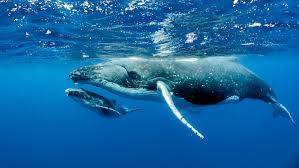The Good Whale: A Symbol of Environmental Stewardship and Hope
The whale has long been a symbol of the natural world's awe-inspiring power and beauty. Revered in numerous cultures, the whale is often seen as a creature of mystery and grace, embodying qualities that inspire a deep connection with the ocean and the planet as a whole. However, in recent decades, whales have also come to represent the environmental challenges facing our oceans and the urgent need for conservation. In this context, the "Good Whale" emerges as a powerful metaphor, symbolizing the harmonious relationship between humanity and nature, as well as the positive change we can effect in our stewardship of the Earth.
The Role of Whales in Ocean Ecosystems
Whales are much more than majestic creatures swimming through the deep blue sea. As some of the largest animals on Earth, they play an essential role in the health of marine ecosystems. Their movements and behaviours influence the distribution of nutrients in the ocean. Through a process known as "whale pump," whales help circulate nutrients that foster the growth of phytoplankton, tiny marine organisms that form the basis of the ocean's food chain. These plankton are also responsible for producing much of the planet’s oxygen.
Furthermore, whales contribute to the carbon cycle in a significant way. The massive bodies of whales store large amounts of carbon, which, when they die, sink to the ocean floor, effectively locking away carbon that would otherwise be in the atmosphere. The presence of whales thus supports a balanced and healthy marine ecosystem, which in turn helps regulate the Earth's climate.
Threats to Whales and Their Habitats
Despite their critical importance, whales face numerous threats, most of them caused by human activity. Commercial whaling, though significantly reduced since the mid-20th century, still exists in some parts of the world, and the legacy of overhunting continues to impact certain whale populations. Additionally, pollution—especially plastic waste—has become a pervasive danger, with whales ingesting debris or becoming entangled in discarded fishing nets. Climate change also poses a growing threat, as ocean temperatures rise and ecosystems become less stable, affecting the migration patterns and feeding grounds of whales.
Whale populations have declined over the past few centuries, and many species are still considered endangered or vulnerable. For example, the North Atlantic right whale, with fewer than 400 individuals left, is at risk of extinction unless effective conservation measures are implemented.
The Good Whale: A Symbol of Hope
Amid these challenges, the "Good Whale" stands as a symbol of the hope and resilience of the natural world. Efforts to protect whale populations have gained momentum, with international agreements such as the International Whaling Commission (IWC) working to prevent commercial whaling and promote conservation. Marine protected areas (MPAs) have been established, providing safe havens for whales to migrate, breed, and feed without the threat of human interference.
Environmental organizations, scientists, and activists around the world are rallying to raise awareness of the plight of whales and the importance of ocean health. The "Good Whale" represents not only the resilience of these incredible creatures but also humanity's capacity to correct course, restore ecosystems, and protect vulnerable species.
In the broader context of climate change and environmental degradation, the whale offers a powerful reminder that a healthier, more sustainable world is possible. By supporting policies that safeguard marine life, reducing pollution, and promoting sustainable fishing practices, we can all play a role in ensuring that the whale—along with countless other species—continues to thrive for generations to come.
Conclusion
The "Good Whale" is more than just a figure of beauty in our oceans; it is a symbol of the interconnectedness of life on Earth and the need for collective action in environmental stewardship. By learning from the resilience of these magnificent creatures and recognizing the importance of healthy oceans, we can work together to protect the future of our planet—and the "Good Whale" that inhabits its waters.


